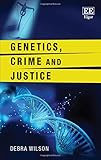Genetics, Crime and Justice / Debra Wilson, Senior Lecturer in Law, School of Law, University of Canterbury, New Zealand.
Publisher: Cheltenham, UK ; Northampton, MA, USA : Edward Elgar Publishing, [2015]Copyright date: ©2015Description: vii, 260 pages ; 25 cmContent type:- text
- unmediated
- volume
- 9781783478811 (cased)
- 1783478810 (cased)
- 614.1 WIL 23
- RA1057.5 .W55 2015
- 2015 L-395
- W 750
| Item type | Current library | Collection | Shelving location | Call number | Status | Date due | Barcode |
|---|---|---|---|---|---|---|---|
 BOOKs
BOOKs
|
National Law School | Reference | NAB Compactor | 614.1 WIL (Browse shelf(Opens below)) | Available | 36102 |
Browsing National Law School shelves, Shelving location: NAB Compactor, Collection: Reference Close shelf browser (Hides shelf browser)

|

|

|

|

|

|

|
||
| 338.83 WHI Cross-border mergers and acquisitions / | 338.9 FLO The reform of network industries : | 582.160942 BIN Trees and timber in the Anglo-Saxon world / | 614.1 WIL Genetics, Crime and Justice / | 628 BHA Bridging the gap between engineering and the global World : | 630.9756 PET Standing their ground : | 658.403 KAH Choices, values, and frames / |
Includes bibliographical references and index.
1. Introduction
2. History of genetics and criminal justice;
3. Use of genetics in criminal investigations;
4. The 'criminal gene';
5. The 'criminal gene' argument in the courts;
6. The impact of a 'criminal gene' argument on punishment theory;
7. Introduction to ethical issues;
8. Concluding thoughts;.
As our understanding of genetics increases, its application to criminal justice becomes more significant. This timely book examines the use of genetic information both in criminal investigations and during the trial process. It discusses current scientific understanding and considers some potential legal, ethical and sociological issues with the use of genetic information. The author draws together debates from scientists, ethicists, sociologists and lawyers in order to understand how the criminal justice system currently reacts, and ought to react, to the new challenges presented by genetic evidence. She asks the important question of where priorities should lie: whether with society's desire to be protected from crime, or with an individual's desire to be protected from an unwanted intrusion into his or her genome. Topics include rights of privacy and consent in obtaining DNA samples, evidentiary issues in court, the impact of genetic evidence on punishment theory and sentencing, and genetic discrimination. This book will be of use to criminal and medical law students, along with academics, practitioners and policymakers interested in exploring the various criminal law issues in relation to genetics. It will also be of interest to criminal justice, philosophy, ethics, sociology and psychology students and academics looking explore the legal issues involved in such a topic.-- Source other than Library of Congress.

There are no comments on this title.